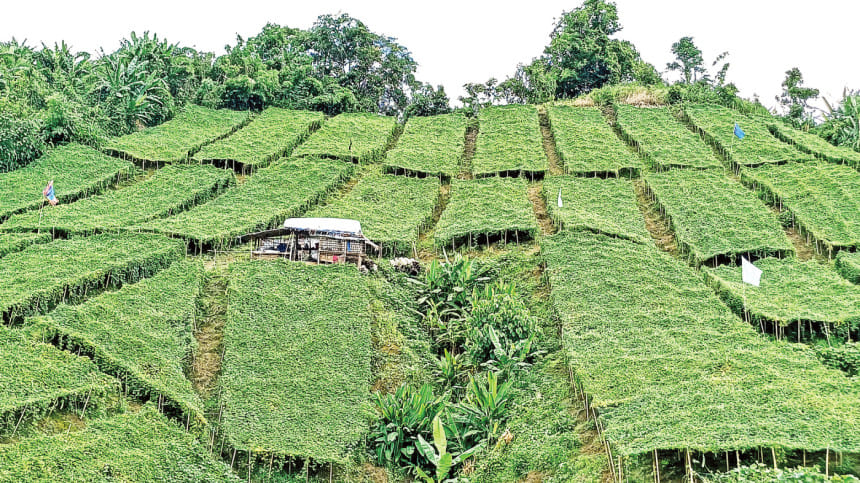From jhum to vegetable farming: A new trend in Bandarban

Just a few years ago, jhum farming defined the landscape of Chimbuk's hillside areas of Sualok and Tongbati in Bandarban Sadar upazila. Farmers cleared forest patches, burned undergrowth, and planted rice, maize, or spices. After harvest, the land would be left fallow for years to recover its fertility.
That scenery has changed dramatically, with lush green vegetable fields taking over the areas these days.
Farmers from the Mro, Marma, and Tanchangya communities are now planting cucumbers, bitter gourds, yardlong beans, and pumpkins on lands that once yielded only jhum rice. The reason is simple: better returns, quicker harvests, and fewer hassles.
"Vegetable farming is less expensive and gives quicker returns," Patui Mro, a farmer from Tongbati, said, standing beside his thriving cucumber plot.
"Earlier, we had to wait months to harvest jhum rice and then transporting it to the market cost a lot. Now buyers come straight to our fields. We earn more and spend less," he added.
Nearby, in Sualok Majher Para, farmers Swe Kyaw Marma and Bado Marma shared similar experiences.
Cucumbers now sell at Tk 30 per Kilogramme (kg), bitter gourds at Tk 40, and yardlong beans at Tk 40-Tk 50 directly from the fields.
"The money comes in regularly," Swe Kyaw said with a smile. "We can now plan for our children's education and other needs."
For many families, vegetable cultivation has brought a revolutionary change. Jhum required limited cultivation and harvest. But with vegetables, multiple harvests are possible in a single season.
"With jhum, we waited for one harvest a year. Now, we can grow two or even three crops. It's changing our lives," said Sukumer Tanchangya, a farmer.
Local traders have stepped in to bridge the gap between remote farms and big markets.
"We collect vegetables directly from the fields and deliver them to main dealers in Chattogram's Caranihat," said Md Faruque. "From there, the produce goes to Cox's Bazar Rohingya camps, Chattogram city, Cumilla, and even further afield."
The farmers no longer have to worry about transportation or unsold crops, said Md Bashir, who does similar work to Faruque. "The growing demand for fresh produce means regular cash flow and more financial security."
Mohammad Shah Newaz, deputy director of the Department of Agricultural Extension in Bandarban, told The Daily Star that the shift marks "a new milestone" for hill agriculture.
"Vegetable farming is helping reduce dependence on jhum cultivation, which often leads to forest clearing," he said.
"But we must also focus on soil fertility and water management so that farming does not harm the fragile ecosystem in the long run," he added.
He also warned that excessive use of pesticides in commercial vegetable farming could harm biodiversity, as many hill birds, insects, and animals depend on fruits and crops for survival.
While more improvements can surely be made, for hillside farmers, the change in cultivation is akin to a fresh start in life.
"We are earning more than before. This year, I used my earnings to repair my home," said Paraw Mro, a farmer in Sualok. "For us, this is hope for a better future."

 For all latest news, follow The Daily Star's Google News channel.
For all latest news, follow The Daily Star's Google News channel. 



Comments